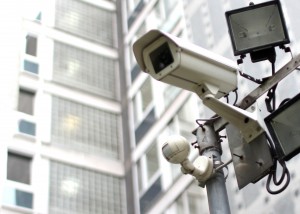If you’ve had a surveillance system installed within the past decade it’s more than likely that it’s either an analog or IP (Internet Protocol) system. So what’s the difference? Analog typically refers to an older technology that doesn’t use Ethernet protocol. IP includes “IP-addressable items,” the cabling, and network equipment used to connect all components to an Ethernet networked system. As people transition to a fully digital IP system there is some overlapping of the two technologies creating hybrids. Upgrading to IP cameras isn’t always as daunting as it may seem, and there are options that make the transition easier.
So why make the switch from analog to IP? For one, a fully digital IP system will have improved performance over an analog system. Many IP cameras are equipped with features like, “advanced digital signal processing, optical zoom lenses, wide dynamic range, on-board analytics and auto image stabilizers…” These features in conjunction with high resolution megapixel cameras provide better coverage and the ability to cover more area with less cameras. Being able to expand or re-configure, also referred to as scalability, comes easily with an IP system. This is an advantage to any organization especially one that plans on expanding or renovating in the future as the initial investment cost isn’t lost in the process.
With IP surveillance systems comes advanced analytics. That means footage can be monitored, recorded, interpreted, archived, and retrieved by the central server as well as peripheral devices. How is this beneficial? It helps when looking for specific recordings as a search can be initiated versus having to view hours of useless footage. If an alarm is activated this type of intelligence can be used to zoom in on what is setting it off which cuts down on time looking for what it might be.
There’s also a flexibility that comes with converting to an IP system. It makes system integration easier when it comes to adding features like access control, alarms, and extra cameras. You also have more of a reason to store a higher volume of footage with an IP system because the image quality is clearer and be accessed easily. Having an IP system allows for ease of software upgrades which helps keep it relevant. In that sense IP is worth the initial up front cost as it is more adaptable to future technologies and won’t require extensive re-cabling and labor in years to come.
Does this mean you have to completely abandon your analog system all at once? Not necessarily. As each system is different the only real way to tell what will need to be done is to hire a security systems expert to do an in person assessment of the current situation. One option might be to use the existing analog equipment and simply add converters to the camera and network switch ends of the cabling. This creates a sort of hybrid system where you’re using existing coax cable from the analog system but the converters allow you to add IP cameras; they don’t have to rely on your company’s network and can still be recorded on your DVR, NVR, or VMS (Digital Video Recorder, Network Video Recorder, and Video Management System).
The benefit to a hybrid system is you don’t lose out on the initial investment of the original system and it allows for easy add-ons, upgrades and replacements of IP technology. The other option is to completely remove all analog devices and cabling and start over with a new IP system. Sometimes IP systems can utilize existing analog infrastructures so that could be an alternative to starting from scratch. Remember if you have an IT department at your facility it is important to include them in the process to ensure a seamless integration.
Whether you’re looking to upgrade to and IP system all at once or try the hybrid approach it’s key to include a licensed security systems expert from the beginning. They can help guide you through the process from start to finish. We understand that each facility is unique and requires individualized security solutions.
If you live or run a business in Central or Northern New Jersey and would like information on any of the topics discussed above, please call 800-369-3962 or simply CLICK HERE.

